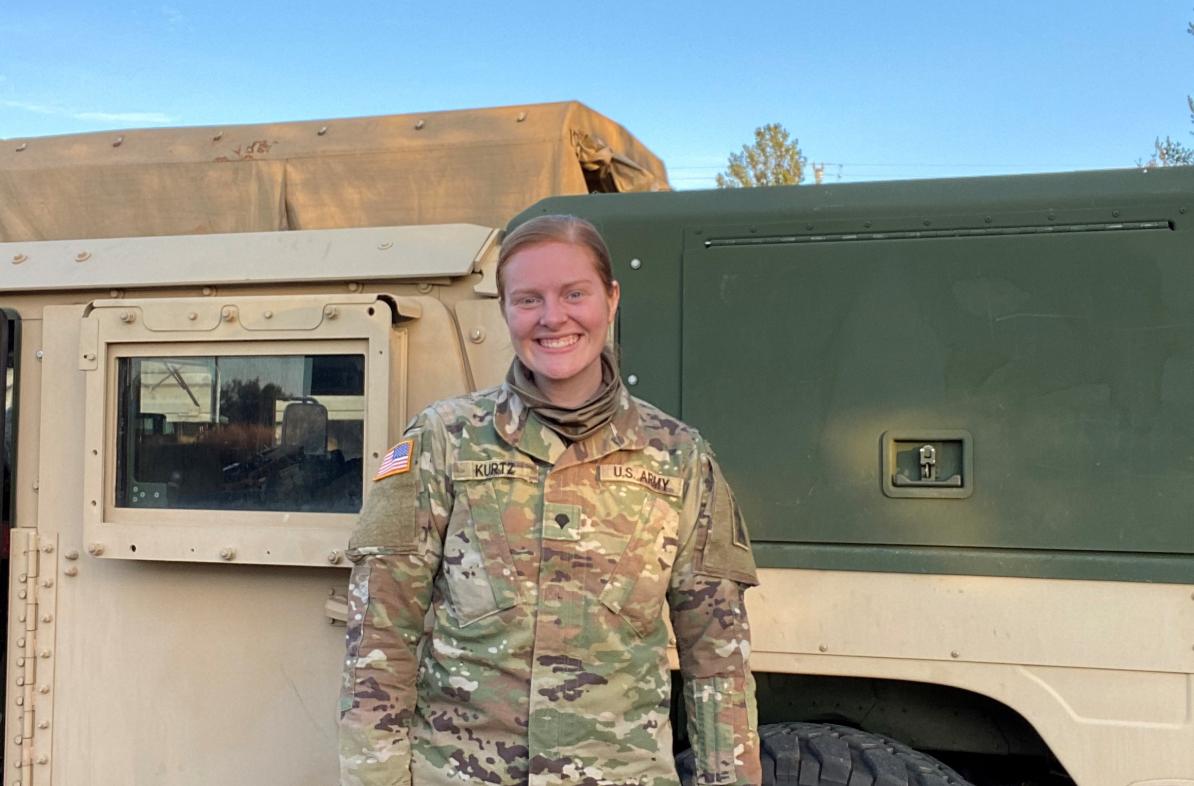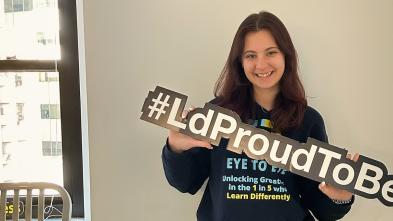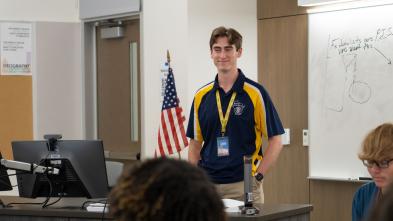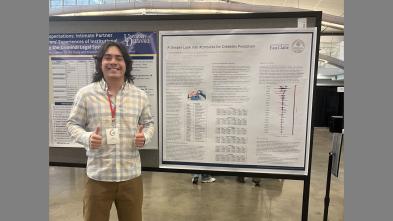
Senior social work major hopes to help fellow veterans: Paige Kurtz
Every student at the University of Wisconsin-Eau Claire was thrown a curve ball by COVID-19, with logistical, mental and emotional gymnastics required of everyone throughout most of 2020.
For Blugolds who are members of the military, adaptations during the pandemic often took on a whole different meaning.
Blugold senior social work major and U.S. Army National Guard member Paige Kurtz accepted an activation in April 2020, deployed to southern Wisconsin to install and run COVID-19 testing sites. Kurtz and one other member of her company were placed on a team with other Wisconsin soldiers.
The deployment, however, lasted longer than Kurtz had anticipated.
“When I left for COVID duty, I assumed I would be gone about 30 days,” says Kurtz, whose battalion was deployed in recent years to the unrest in Kenosha, the 2020 inauguration in Washington, D.C., and to Afghanistan.
“We were activated for three and a half months, setting up sites and conducting testing throughout the southern part of the state,” Kurtz says.
The student-soldier reality
When she left Eau Claire in April 2020 with the HHC 1-128th Infantry Battalion, Kurtz, a Marathon native, was a junior carrying a full-time course load of 15 credits. Even though all UW-Eau Claire courses had transitioned to online instruction, the rigor of the multi-location assignment would not allow time to complete her semester courses.
“My job is to set up all the communication needs for an installation, configuring radio setup and making sure the technology and the systems work properly,” she says.
“There were several of us on my team who were all students, so we just had to work our coursework into our schedules whenever we could,” she says about finishing her courses.
Kurtz says she relied on a strength she sees as common among fellow military students.
“Whether it is the reserves or National Guard, as military students we become excellent at balancing our time — we have to be. I finished all my classes over a couple of months.”
In addition to helping her become a better time manager, Kurtz’s military life helped her discover a career calling. With plans to pursue a master’s degree in counseling, Kurtz hopes to combine her degrees in a career focused on creating a culture that is more proactive about mental health care, especially among active-duty military and veterans.
A passion rooted in loss
While Kurtz says she always has planned to work in some aspect of the “helping” professions, it was her personal experience with military suicide rates that ultimately brought her to her current social work and counseling career plan.
“In my brigade alone, we’ve had six deaths by suicide, one of whom was a good friend from my COVID deployment,” Kurtz says. “In civilian life and here on this campus, I see all the mental health care promotion, suicide prevention efforts — all the things we know can make a difference. Then in my military life, I see a dire need for all those sorts of measures; it’s a really big issue.”
Noting a military culture that is not always open to the idea of “getting help” for anxiety or depression, Kurtz wants to see change in the mindset of service men and women, a shift toward more proactive mental health care.
“There is a fear of seeking help,” she says. “It’s too often perceived as a sign of weakness, so soldiers will fake being OK in order not to be kept from active duty.”
Beyond that stigma, Kurtz says that military personnel often feel that counseling for their issues will not be helpful because of a pervasive sentiment that “nobody understands what our life is like, so why bother talking to someone.”
That’s exactly where she hopes to make a difference, to become the person fellow veterans can open up with, a trusted person who does know what military life is like.
“I’ve been through the structures of the military, I understand how difficult it can be to seek help, and while our exact experiences might differ, I could be that person for someone struggling,” she says.
Admitting that the exact career endgame is still years away and her choices and preferences may change, Kurtz says that ending up working in the veteran services field would make her very happy. From a family with generations of military service, she is the first woman in her family to serve and says the idea of giving back in this way is appealing.
Already making a difference at UW-Eau Claire with SPARC
Kurtz is eager to gain as much practical experience as possible prior to graduate school and is taking advantage of unique student opportunities in the areas of mental health promotion and suicide prevention at UW-Eau Claire. She is in her second year of working with the SPARC program, the UW-Eau Claire Suicide Prevention and Research Collaborative.
Established by psychology professor Dr. Jennifer Muehlenkamp, SPARC is a multifaceted initiative involving mental health outreach, programming, training, academics, research and policy/protocol development that brings together multiple campus offices, staff and resources to address student mental health.
Christina Prust is a health educator with Student Health Service who works with peer-to-peer student outreach volunteers in SPARC, developing programming and training student peer educators like Kurtz to conduct various forms of campus outreach programs.
“Paige is very passionate about her work with SPARC and mental health promotion and suicide prevention on campus,” Prust says. “She expressed to me that facilitating the Lifesavers Suicide Prevention presentation for ROTC was something she thought was very important. Paige reached out to ROTC leadership about presenting to soldiers on campus.”
Kurtz and fellow Lifesavers peer educators did indeed present to ROTC, information that was well received.
“The really cool thing about college students is that they tend to be super open in general, willing to talk about what’s going on in their lives,” she says. “That’s a very different world than we see military side, so making those ROTC connections at this time might help that down the road.”
As a self-declared empath, Kurtz is following her heart when it comes to school and career goals, and her drive to help fellow veterans is opening doors to even wider career possibilities — options that Prust and others around her see growing all the time.
“Paige has been great to work with, and all her efforts helping to promote mental health and suicide prevention around campus and specifically within the military community is making a positive impact and helping save lives,” Prust says.
Miranda Cross-Schindler, UW-Eau Claire’s military and veteran services manager, recognizes the ways that Kurtz uses her outreach experiences to fully merge her student and military roles to the benefit of others.
“Paige not only balances school and military service, but she volunteers in many meaningful ways,” Cross-Schindler says. “She recently offered to take part in a program planning session with the Wisconsin Department of Veterans Affairs, lending her perspective as a female soldier to vital discussions surrounding health care and mental health promotion in the military.”
Next steps: Complete military commitment and enroll in grad school
As Kurtz prepares to graduate this December, she is excited for the next phases of her life and moving toward her professional goals.
“I went into social work because I wanted to help people, but it’s so much more than that,” she says. “The more I’ve learned about the field, the more I see how wide the lanes are and how many different ways I could use this degree.”
In her final semester, Kurtz has been placed in an internship for Dunn County working in the behavioral health department. In this role, she has been able to see the breadth of specialties in social work and is proud to become part of a field that can bring about major positive impacts on so many different levels for groups and individuals.
“Whether it is in behavioral health, criminal justice, youth justice, child protective services, disability support, aging populations or my interest in veterans’ services — the range of opportunities to make a difference is really exciting,” she says.
Kurtz will complete her six-year commitment to the U.S. Army in July 2022. She has not yet decided whether she will enlist again and pursue her professional goals from within the military or if she will seek a civilian role in the field of mental health care. But one thing is certain — Kurtz has the knowledge, the experience and the big heart to bring about the positive changes she hopes to see in how society approaches mental health care.
If you or anyone you know is suffering with thoughts of suicide, please call the National Suicide Prevention Lifeline at 1-800-273-TALK (8255) or text "Hello" to the National Crisis Text Line, 741741. Trained experts are available at both services to help, without judgment.
For more information about Counseling Services at UW-Eau Claire, please visit their website or call 715-836-5521.
For more information about services for military veterans at UW-Eau Claire, contact veterans@uwec.edu.
You may also like


